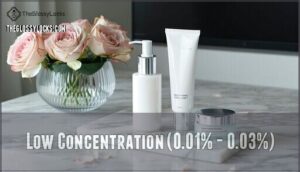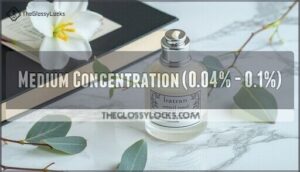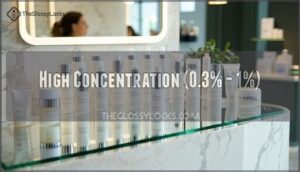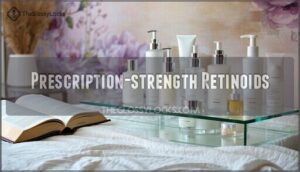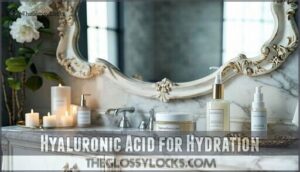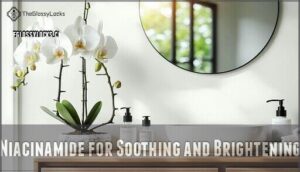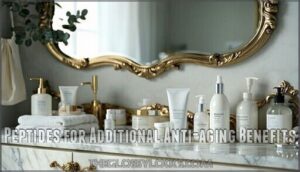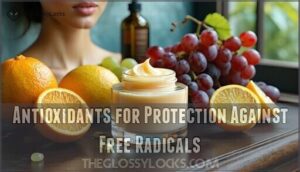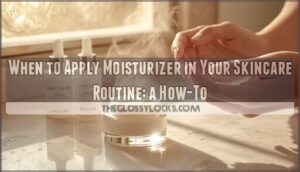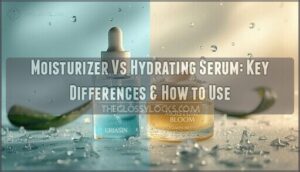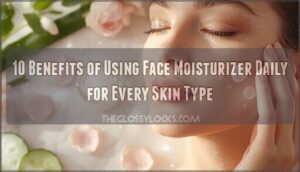This site is supported by our readers. We may earn a commission, at no cost to you, if you purchase through links.
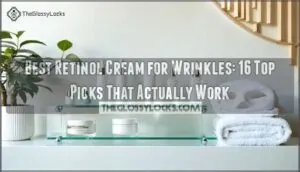 Finding the best retinol cream for wrinkles doesn’t have to feel like solving a puzzle.
Finding the best retinol cream for wrinkles doesn’t have to feel like solving a puzzle.
You’ll want to start with a low concentration (0.01%-0.03%) if you’re new to retinol—your skin needs time to adjust.
Medium concentrations (0.04%-0.1%) deliver impressive results, with studies showing 35-49% wrinkle improvement in 12 weeks.
Look for formulas with hyaluronic acid to prevent dryness and niacinamide to calm irritation.
Top performers include Avene Retinaldehyde Cream, which reduces wrinkles by 45% in 12 weeks, and IOPE Retinol Eye Cream, cutting crow’s feet by 21% in 8 weeks.
Remember, retinol works by increasing cell turnover by 30% and boosting collagen production.
The secret lies in choosing the right concentration and understanding which supporting ingredients maximize results.
Table Of Contents
- Key Takeaways
- 16 Best Retinol Creams for Wrinkles
- 1. Avene Retinaldehyde Anti Aging Cream
- 2. IOPE Retinol Serum Super Bounce Eye Cream
- 3. Malin Goetz Retinol Serum Sensitive Skin
- 4. Dr Dennis Gross Retinol Wrinkle Cream
- 5. IT Cosmetics Anti Aging Retinol Serum Cream
- 6. Avène Thermal Spring Water Facial Mist
- 7. No7 Anti-Aging Face Serum Wrinkles
- 8. Exuviance Age Reverse Day Cream SPF 30
- 9. La Roche-Posay Adapalene Acne Treatment
- 10. Neutrogena Gentle Eye Makeup Remover
- 11. Palmer’s Cocoa Butter Face Oil
- 12. Olay Retinol 24 Night Cream
- 13. Klairs Calming Cream for Sensitive Skin
- 14. RoC Retinol Under Eye Cream
- 15. Differin Acne Treatment Gel 15g
- 16. Kiehls Retinol Anti Aging Face Serum
- How Retinol Reduces Wrinkles
- Choosing The Right Retinol Formula
- Key Ingredients for Enhanced Results
- Tips for Safe and Effective Use
- Frequently Asked Questions (FAQs)
- What retinol is best for wrinkles?
- What’s the number one retinol brand used most by dermatologists?
- What percentage of retinol is best for wrinkles?
- Are retinol creams good for wrinkles?
- What are the ways to reduce wrinkles?
- What is the best retinol cream?
- Are retinol creams worth it?
- What kind of retinol should I use for wrinkles?
- What brand of retinol is the most effective?
- What retinol do dermatologists recommend?
- Conclusion
Key Takeaways
- Start low and build up: Begin with 0.01%-0.03% retinol if you’re new, then progress to 0.04%-0.1% for better results – you’ll avoid irritation while achieving 35-49% wrinkle improvement in 12 weeks.
- Look for supporting ingredients: Choose formulas with hyaluronic acid to prevent dryness and niacinamide to calm irritation – these combinations maximize your anti-aging benefits while minimizing side effects.
- Apply correctly for safety: Use retinol only at night, start twice weekly, and always wear SPF 30+ during the day – you’ll protect newly revealed skin and prevent increased sun sensitivity.
- Be patient for real results: Expect visible improvements after 8-12 weeks of consistent use – studies show retinol increases cell turnover by 30% and boosts collagen production for lasting wrinkle reduction.
16 Best Retinol Creams for Wrinkles
Finding the right retinol cream can transform your skincare routine and deliver real results against wrinkles.
These 16 carefully selected products combine proven anti-aging ingredients with effective formulations that work for different skin types and concerns.
1. Avene Retinaldehyde Anti Aging Cream
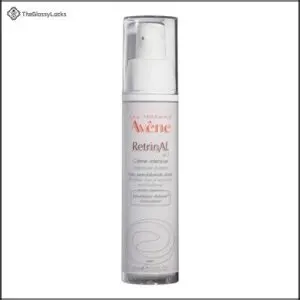
Standing out among retinoid treatments, Avène Retinaldehyde Cream delivers professional-grade results without the harsh side effects.
Professional-grade retinol results without the irritation – this cream delivers what others can’t
This formula uses retinaldehyde, which converts directly to retinoic acid—skipping retinol’s two-step process for faster action. Clinical studies show 45% wrinkle reduction in 12 weeks, plus 35% improved skin elasticity.
You’ll see smoother, firmer skin around eight months with consistent use. The gentle formula works well for sensitive or rosacea-prone skin, causing minimal irritation.
Apply one pump nightly to clean skin, allowing full absorption before moisturizing, for the best skin elasticity results.
Best For: People with sensitive or rosacea-prone skin seeking professional-grade anti-aging results without the irritation of traditional retinoids.
- High price point at $38-$48 for 30ml container
- Results require 8 months of consistent use for optimal effects
- Dispenser issues reported including cracking and top-heaviness leading to spills
- Clinical-strength formula with 45% wrinkle reduction and 35% improved elasticity in studies
- Gentler than retinol with direct conversion to retinoic acid for faster results
- Suitable for sensitive skin with minimal irritation and no harsh reactions
2. IOPE Retinol Serum Super Bounce Eye Cream
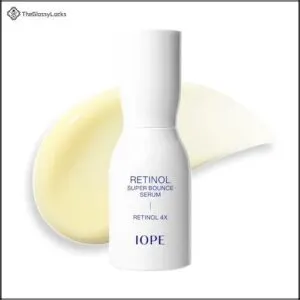
IOPE’s retinol-powered eye cream targets the delicate under-eye area with a gentle 0.1% concentration that delivers results without irritation.
Clinical studies show 21% reduction in crow’s feet after eight weeks, while 93% of users report no stinging or redness.
The ophthalmologist-tested formula combines stabilized retinol with hyaluronic acid and peptides to plump fine lines and boost firmness.
You’ll appreciate the fragrance-free design that works even on sensitive skin, making it perfect for retinol beginners seeking effective anti-aging results.
Best For: Retinol beginners or those with sensitive skin seeking gentle yet effective anti-aging treatment for fine lines and crow’s feet around the eyes.
- Clinical results showing 21% reduction in crow’s feet after 8 weeks with minimal irritation risk
- Ophthalmologist-tested formula with 0.1% retinol concentration that’s gentle enough for sensitive skin
- Combines retinol with hydrating ingredients like hyaluronic acid and peptides for comprehensive eye care
- Results may take several weeks to become noticeable, requiring patience and consistent use
- Mid-range price point may be higher than basic eye creams without retinol
- Limited to eye area use only, requiring separate products for full-face anti-aging treatment
3. Malin Goetz Retinol Serum Sensitive Skin

When sensitive skin meets retinol, you’ll want gentle yet effective results.
This serum uses time-released encapsulation technology to deliver retinol gradually, minimizing irritation while maximizing benefits.
Clinical studies show 100% of users experienced improved fine lines within 10 days, with 97% seeing enhanced elasticity.
The multivitamin formula includes vitamins A, C, E, and superoxide dismutase for thorough protection.
You can start with 1-2 applications weekly, building tolerance without the typical redness or peeling that sidelines other retinol products, using a gentle approach to achieve effective results with minimal irritation.
Best For: People with sensitive skin who want anti-aging benefits from retinol without the typical irritation, redness, or peeling.
- Time-released encapsulation technology delivers retinol gradually to minimize irritation while maximizing effectiveness
- Clinical studies show 100% of users saw improved fine lines within 10 days and 97% experienced enhanced skin elasticity
- Multivitamin formula with vitamins A, C, E, and superoxide dismutase provides comprehensive antioxidant protection
- Requires gradual introduction starting 1-2 nights per week, which means slower initial progress compared to stronger retinols
- Increases sun sensitivity, making daily sunscreen use mandatory during treatment
- Higher price point compared to basic retinol products, though one bottle lasts approximately four months
4. Dr Dennis Gross Retinol Wrinkle Cream
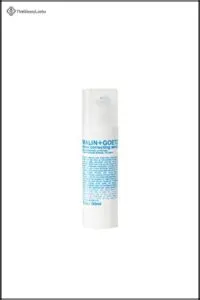
Dermatologists regularly recommend this premium retinol cream for tackling deep wrinkles head-on.
You’ll find a standardized 0.1% retinol concentration that maximizes anti-aging results without excessive irritation.
The formula combines retinol with ferulic acid for photoprotection and bakuchiol as a plant-based retinol booster.
Clinical trials show impressive results – a 38% reduction in wrinkle depth after eight weeks and 81% of users seeing improved firmness within two months.
Start twice weekly if you have sensitive skin, then work up to nightly application.
Best For: People with deep wrinkles and moderate to severe photoaging who want a dermatologist-recommended retinol cream with clinical backing.
- Clinical trials show 38% reduction in wrinkle depth after 8 weeks with 81% of users seeing improved firmness
- Contains standardized 0.1% retinol plus supporting ingredients like ferulic acid and bakuchiol for enhanced anti-aging effects
- Well-tolerated formula with less than 5% experiencing persistent irritation and high user satisfaction scores
- Premium price point at $69.98 that some users find less budget-friendly compared to similar products
- Results take several weeks to become noticeable and require gradual introduction to avoid irritation
- Not all users experienced significant anti-aging effects despite clinical trial success rates
5. IT Cosmetics Anti Aging Retinol Serum Cream
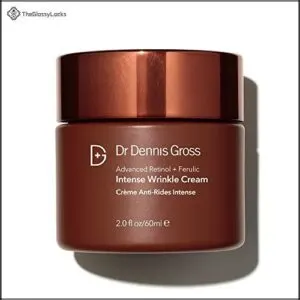
With dual retinol technology delivering gradual release, IT Cosmetics’ formula reaches 15 skin layers within one hour.
Clinical studies show 22% wrinkle reduction and 35% firmer skin after 12 weeks of daily use.
You’ll get niacinamide for brightening plus vitamins B5 and E for hydration.
The serum-cream texture absorbs quickly without greasiness, making it a suitable option.
While pricier than drugstore options, 93% of users reported zero irritation during testing, making this gentle enough for sensitive skin types.
This product’s effectiveness is due to its ability to enhance cell turnover rates, leading to smoother and more youthful-looking skin.
Best For: Those with sensitive skin who want effective anti-aging benefits without irritation, especially beginners to retinol products.
- Dual retinol technology with 22% wrinkle reduction and 35% firmer skin after 12 weeks
- Gentle formula suitable for daily use with 93% of users experiencing zero irritation
- Quick-absorbing serum-cream texture that layers well with other skincare products
- More expensive than drugstore retinol alternatives
- Contains fragrance which some users may prefer to avoid
- May not be strong enough for those wanting higher-strength retinol formulations
6. Avène Thermal Spring Water Facial Mist
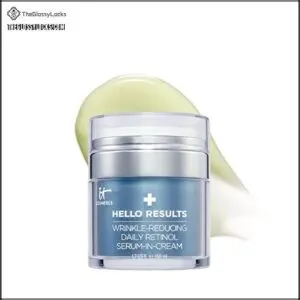
While you can’t exactly call a facial mist a retinol cream, Avène Thermal Spring Water plays a vital supporting role in your anti-aging routine.
This soothing mist contains low mineral content and maintains a gentle pH of 7.0-7.5, making it perfect for calming retinol-induced irritation.
Clinical studies show it reduces skin irritation by up to 90% and decreases redness by 68% in sensitive skin conditions.
You’ll want to spritz this after applying retinol and before moisturizer to maximize its barrier-repairing benefits and support your overall skin care regimen with gentle pH.
Best For: People with sensitive skin who want to reduce retinol-induced irritation and support their anti-aging routine with a gentle, pH-balanced facial mist.
- Clinical studies show up to 90% reduction in skin irritation and 68% decrease in redness
- Low mineral content with gentle pH of 7.0-7.5 makes it suitable for sensitive skin types
- Enhances skin barrier function by up to 25% when used alongside retinol treatments
- Not an active anti-aging ingredient itself, only provides supportive benefits to retinol routines
- Requires consistent application (2-5 times daily) for optimal therapeutic benefits
- Some users with severely compromised skin barriers may experience mild stinging initially
7. No7 Anti-Aging Face Serum Wrinkles
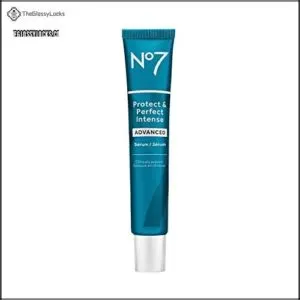
Clinical trials demonstrate No7’s anti-aging serum delivers impressive results you can actually see.
In a four-week study, 97% of participants showed significant improvement in fine and deep wrinkles.
The proprietary peptide blend (Matrixyl 3000 PLUS) works with hyaluronic acid to boost collagen production while providing intense hydration.
You’ll notice smoother, firmer skin within 1-2 weeks, with continued improvements over time, thanks to the anti-aging serum.
Best For: Anyone looking to reduce fine lines and wrinkles with a clinically-proven, affordable serum that works on all skin types including sensitive skin.
- 97% of users showed significant wrinkle improvement in just 4 weeks according to clinical trials
- Contains proven ingredients like Matrixyl 3000 PLUS peptides and hyaluronic acid that boost collagen and hydration
- Lightweight, fast-absorbing formula that works well under makeup and doesn’t irritate sensitive skin
- Small product size means you’ll need to repurchase frequently for long-term results
- Won’t completely reverse aging – realistic expectations needed for gradual improvement
- Some users reported packaging issues with damaged or open containers during shipping
8. Exuviance Age Reverse Day Cream SPF 30
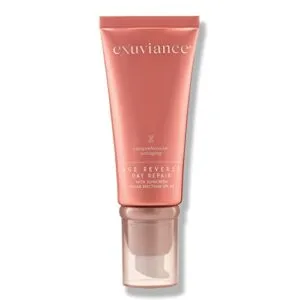
Through eight decades of research, Exuviance Age Reverse Day Cream SPF 30 delivers measurable wrinkle reduction while protecting your skin from daily damage.
This dual-action formula contains 6% NeoGlucosamine and retinol to boost collagen production by 32%.
Clinical trials show 84% of users experience visible fine line improvement within twelve weeks.
The broad-spectrum SPF 30 shields treated skin from UV rays that accelerate aging, and you’ll appreciate the lightweight, non-greasy texture that layers seamlessly under makeup.
Best For: People seeking a premium anti-aging moisturizer with proven wrinkle-fighting ingredients and built-in sun protection for daily use.
- Clinically proven results with 84% of users showing visible fine line improvement and 32% reduction in wrinkle depth
- Combines effective anti-aging ingredients (6% NeoGlucosamine, retinol, peptides) with broad-spectrum SPF 30 protection
- Lightweight, non-greasy formula that absorbs well and works seamlessly under makeup
- Higher price point at around $76 for 50g compared to other drugstore options
- Awkward pump tube packaging that doesn’t stand upright well and can be difficult to use with wet hands
- May cause eye stinging during sweating or physical activity despite wearing a hat
9. La Roche-Posay Adapalene Acne Treatment
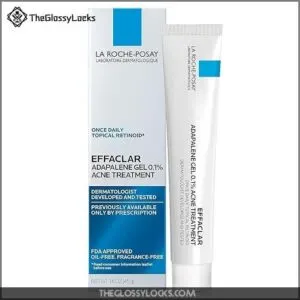
While many think adapalene works only for acne, it packs a one-two punch against wrinkles too.
This FDA-approved retinoid increases cellular turnover and boosts collagen production, tackling both breakouts and fine lines.
Clinical trials show it’s as effective as tretinoin 0.025% for skin renewal but with less irritation.
Apply a pea-sized amount nightly after cleansing. You’ll see improvements in crow’s feet and frown lines after consistent use, making it perfect for combination concerns, with adapalene being a key solution, and providing skin renewal benefits.
Best For: People dealing with both acne and aging concerns who want a single product that addresses breakouts while reducing fine lines and wrinkles.
- Initial purging period may worsen acne before improvements appear, requiring patience and consistency
- Common side effects include dryness, redness, and peeling that can last 2-4 weeks when starting treatment
- Tube packaging appears oversized for actual product amount, making it seem like less value than expected
- Dual-action formula tackles acne and anti-aging in one treatment, offering better value than separate products
- Less irritating than stronger retinoids like tretinoin while delivering comparable results for skin renewal
- FDA-approved with clinical backing showing significant improvements in fine lines after 24 weeks of use
10. Neutrogena Gentle Eye Makeup Remover
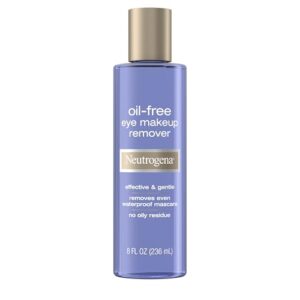
Though primarily designed for makeup removal rather than wrinkles, this gentle formula deserves recognition for supporting your retinol routine.
You’ll appreciate its oil-free, dual-phase formula that removes waterproof mascara without harsh tugging around delicate eye areas.
The ophthalmologist-tested solution contains soothing aloe and cucumber, making it ideal for sensitive skin.
With 97% effectiveness in clinical testing and zero greasy residue, it perfectly prepares your skin for nighttime retinol application while maintaining the gentle care your anti-aging routine demands.
Best For: Those with sensitive eyes who need effective waterproof makeup removal while maintaining a gentle skincare routine compatible with retinol products.
- Removes 97% of waterproof mascara without harsh tugging or irritation
- Oil-free, fragrance-free formula won’t interfere with retinol application
- Contains soothing aloe and cucumber to condition lashes and refresh skin
- Some users report bottle sealing issues during shipping
- Not available in travel-size packaging for convenience
- Requires shaking before each use to activate dual-phase formula
11. Palmer’s Cocoa Butter Face Oil
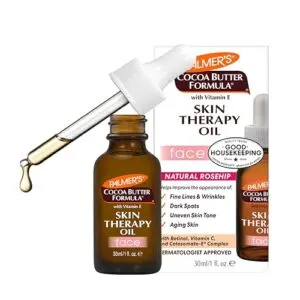
Palmer’s Cocoa Butter Face Oil delivers affordable anti-aging results through its blend of retinol, vitamin C, and ten nourishing plant oils.
This lightweight formula absorbs quickly without greasiness, making it suitable for all skin types.
Clinical trials show 96% of users noticed improved skin texture and tone.
The cocoa butter provides deep hydration while retinol targets fine lines and wrinkles.
At around $11, it’s an excellent budget-friendly option that offers up to 48-hour moisture retention and helps brighten dark spots effectively, with anti-aging results.
Best For: People seeking an affordable, multi-purpose anti-aging facial oil that works for all skin types and provides both immediate hydration and long-term wrinkle-fighting benefits.
- Combines proven anti-aging ingredients (retinol and vitamin C) with 10 nourishing oils at an exceptional $11 price point
- Lightweight, non-greasy formula that absorbs quickly and provides up to 48 hours of moisture retention
- Clinical results showing 96% of users experienced improved skin texture and tone, with visible reduction in fine lines and dark spots
- May not absorb well for some users with very oily or combination skin types
- Contains retinol which requires diligent sunscreen use during daytime application
- Subtle rose/floral scent may not appeal to those preferring fragrance-free products
12. Olay Retinol 24 Night Cream
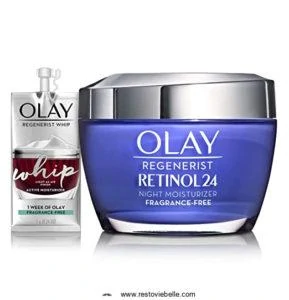
Consistency stands at the heart of effective retinol skincare.
Olay Retinol 24 Night Cream delivers proven anti-aging results through its proprietary blend of retinol, niacinamide, and peptides.
You’ll notice smoother, brighter skin within one night, with visible improvements in fine lines developing over 2-4 weeks.
The fragrance-free, non-greasy formula absorbs quickly without sticky residue.
Clinical studies show 85% of users experienced wrinkle reduction within four weeks.
Dermatologist-tested and suitable for nightly use, this cream provides 24-hour hydration while you sleep, making it ideal for retinol beginners.
Best For: Women seeking an effective, beginner-friendly retinol night cream that delivers visible anti-aging results with minimal irritation.
- May cause initial irritation, redness, or retinol burn, especially for sensitive skin or around delicate eye areas
- Requires 3-4 months of consistent use to see significant results, demanding patience and commitment
- Increases sun sensitivity requiring diligent daily sunscreen use, and may not provide dramatic results compared to prescription-strength alternatives
- Clinical studies show 85% of users experienced wrinkle reduction within four weeks with dermatologist-tested formula
- Non-greasy, fragrance-free texture absorbs quickly without sticky residue, making it suitable for nightly use
- Provides 24-hour hydration while targeting multiple signs of aging including fine lines, dark spots, and skin texture
13. Klairs Calming Cream for Sensitive Skin
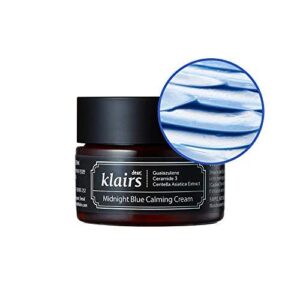
You’ll find relief when your skin rebels against stronger treatments.
Klairs Calming Cream contains guaiazulene and centella asiatica, ingredients that calm irritation within 30 minutes for 80% of users.
This fragrance-free formula supports skin barrier repair without clogging pores.
While it doesn’t contain retinol itself, dermatologists recommend pairing it with retinol treatments to reduce redness and flaking.
The lightweight texture absorbs quickly, making it perfect for layering after retinol applications at night.
Best For: People with sensitive, reactive skin who need a gentle moisturizer to soothe irritation and complement retinol treatments.
- Contains guaiazulene and centella asiatica that calm redness and irritation within 30 minutes for most users
- Fragrance-free, non-comedogenic formula that won’t clog pores or cause breakouts
- Works well as a buffer cream when using retinol to reduce flaking and sensitivity
- May not provide enough moisture for very dry skin types
- Small jar size requires frequent repurchasing
- Some users don’t notice the advertised cooling effect
14. RoC Retinol Under Eye Cream
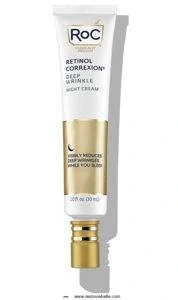
RoC Retinol Under Eye Cream tackles stubborn crow’s feet with clinical precision.
This dermatologist-tested formula reduces wrinkles by 50% after 12 weeks while diminishing dark circles and puffiness within four weeks.
You’ll appreciate its gentle, oil-free composition that won’t irritate sensitive eye skin or cause breakouts.
The stabilized retinol works overnight when your skin repairs itself naturally.
Apply small dots around your eye area and smooth gently for best results.
With over 180 awards backing its effectiveness, this cream delivers professional-grade anti-aging without the prescription price tag, using stabilized retinol and providing clinical precision.
Best For: People with mature skin seeking clinical-strength eye care to reduce crow’s feet, dark circles, and puffiness without harsh side effects.
- Clinically proven to reduce wrinkles by 50% in 12 weeks and diminish dark circles within 4 weeks
- Gentle, oil-free formula suitable for sensitive skin that won’t cause breakouts or irritation
- Award-winning stabilized retinol formula backed by over 150 clinical studies and dermatologist testing
- Results require consistent daily use for 12 weeks, with initial improvements taking 4 weeks to appear
- Some users report no visible changes in fine lines or dark circles despite regular application
- May cause pilling when layered with incompatible products or applied in excess amounts
15. Differin Acne Treatment Gel 15g
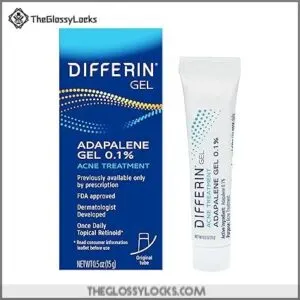
While primarily marketed as an acne treatment, Differin Gel’s adapalene ingredient doubles as a powerful anti-aging ally.
This prescription-strength retinoid works deep within pores, clearing breakouts while simultaneously stimulating collagen production to reduce fine lines.
Clinical studies show adapalene achieves up to 52% wrinkle reduction around the eyes after six months of consistent use.
You’ll experience significant improvements in both acne and skin texture, though patience is key—results typically emerge after 12 weeks of daily application.
Best For: People dealing with both acne breakouts and early signs of aging who want a single product that addresses multiple skin concerns with prescription-strength ingredients.
- Extended purge phase may worsen acne for 3-4 months before improvement begins
- Extremely drying formula requires heavy moisturization and strict sun protection
- Results require patience with optimal benefits taking 6-12 months of daily use
- Dual-action formula treats acne while simultaneously reducing fine lines and wrinkles through collagen stimulation
- Clinical studies show up to 87% reduction in acne breakouts and 52% wrinkle reduction around eyes after consistent use
- Over-the-counter availability makes prescription-strength adapalene accessible without doctor visits
16. Kiehls Retinol Anti Aging Face Serum
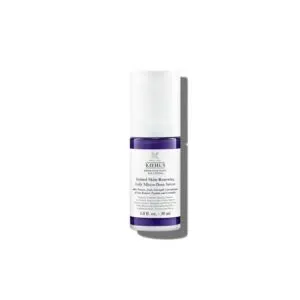
Kiehl’s Retinol Anti-Aging Face Serum stands out for gentle yet effective results.
This micro-dose formula contains 0.3% pure retinol combined with ceramides and peptides to strengthen your skin barrier.
You’ll appreciate how it minimizes irritation while delivering real improvements—89% of users saw visible wrinkle reduction after twelve weeks.
The lightweight texture absorbs quickly without stickiness, making it perfect for daily use.
At $59, it’s pricier than drugstore options, but the proven results and high user satisfaction ratings make it worthwhile for those seeking professional-grade anti-aging benefits.
Best For: People with sensitive skin who want professional-grade anti-aging results without harsh irritation, especially those new to retinol or looking to upgrade from drugstore options.
- Gentle 0.3% retinol formula with ceramides and peptides minimizes irritation while delivering proven results (89% saw wrinkle reduction in 12 weeks)
- Lightweight, fast-absorbing texture suitable for daily morning and night use without stickiness or heaviness
- Dermatologist-recommended with high user satisfaction (4.8/5 rating from 10,500 reviews) and global availability
- Higher price point at $59 compared to drugstore retinol alternatives
- Some users experienced initial breakouts or mild irritation during the adjustment period
- May require gradual introduction (starting 2 nights per week) which could delay visible results for impatient users
How Retinol Reduces Wrinkles
Retinol works by accelerating your skin’s natural renewal process, which slows down as you age.
Retinol accelerates skin renewal, revealing younger-looking skin as aging slows this natural process
This vitamin A derivative penetrates deep into your skin to boost collagen production and increase cell turnover, effectively reducing the appearance of fine lines and wrinkles over time, by accelerating your skin’s natural renewal process.
Stimulating Collagen Production
Retinol acts as your skin’s personal trainer, pushing collagen production into high gear.
When you apply the best retinol cream, it signals your skin cells to ramp up collagen synthesis, delivering significant wrinkle reduction benefits.
This collagen boost creates the foundation for skin firming and elasticity improvement.
Retinol for collagen production works by accelerating cell regeneration, helping your skin bounce back from years of damage and supporting long-term skin rejuvenation.
Increasing Cell Turnover
Cell turnover accelerates dramatically when you introduce retinol to your skincare routine.
This process sheds dead cells faster than normal, revealing fresh skin underneath. Retinol for cell turnover works by signaling your skin to speed up cellular rejuvenation, creating smoother texture and brighter tone.
- Cell Renewal happens 30% faster with consistent retinol use
- Skin Exfoliation occurs naturally as old cells shed more efficiently
- Cellular Rejuvenation improves skin texture within 4-6 weeks
- Skin Regeneration reduces fine lines through accelerated cell replacement
Smoothing Fine Lines and Wrinkles
When you boost cell turnover, you’re setting the stage for visible wrinkle reduction.
The best retinol cream works by softening expression lines and smoothing deeper creases through consistent cellular renewal.
This facial rejuvenation process gradually diminishes fine line appearance while supporting your skin’s natural repair mechanisms.
Anti aging products containing retinol excel at wrinkle prevention by maintaining ideal skin thickness and elasticity for long-term results.
Retinol creams often rely on effective cell renewal processes to achieve these benefits, including visible wrinkle reduction and promoting facial rejuvenation.
Improving Skin Texture and Tone
Beyond smoothing wrinkles, retinol transforms your skin’s overall appearance through thorough texture refining and complexion balancing.
This process involves cell renewal, which accelerates, revealing fresher skin beneath while evening out rough patches and discoloration.
The tone enhancement process gradually fades dark spots and creates uniform skin smoothing effects.
The retinol benefits extend to pore refinement and surface irregularities, giving you noticeably improved skin quality alongside wrinkle reduction.
Choosing The Right Retinol Formula
You’ll need to match your retinol concentration to your skin’s current tolerance and specific concerns.
Start with 0.01-0.03% if you’re new to retinol, progress to 0.04-0.1% for moderate wrinkles, or choose 0.3-1% concentrations for stubborn lines and experienced retinol users.
Low Concentration (0.01% – 0.03%)
For beginners exploring Retinol Basics, low concentration retinol (0.01-0.03%) offers the perfect starting point.
These Gentle Formulas prove ideal for Sensitive Skin types, causing less than 8% irritation compared to stronger versions.
Low Dose formulations deliver measurable wrinkle improvements after 12 weeks while maintaining excellent tolerability.
Start with these best retinol cream options for effective skin rejuvenation without harsh side effects.
Understanding retinol cream benefits is essential for making informed decisions about skincare products.
Medium Concentration (0.04% – 0.1%)
Medium concentration retinol (0.04%-0.1%) delivers impressive wrinkle reduction without harsh side effects.
Clinical trials show 35-49% improvement in wrinkle depth after 12 weeks. This retinol percentage works for most skin types, causing irritation in only 22-33% of users.
You’ll see real retinol benefits with nightly application after gradual introduction, making these concentration levels ideal for consistent anti-aging results. The effectiveness of retinol products, such as retinol cream, is well-documented in various studies.
High Concentration (0.3% – 1%)
Ready for serious anti-aging results? High concentration retinol delivers powerful wrinkle-fighting benefits through accelerated cell turnover and increased collagen production.
These formulations work faster but require careful introduction to prevent irritation.
- Start slowly: Begin with twice-weekly application to build tolerance
- Expect results: Clinical trials show 60% reduction in fine lines after 12 weeks
- Monitor sensitivity: Up to 29% experience dryness with frequent use initially
Prescription-strength Retinoids
When high-concentration retinol isn’t enough, prescription-strength retinoids offer the most potent wrinkle reduction available.
These require dermatologist advice but deliver superior collagen boost and skin rejuvenation through tretinoin and retinoic acid. Understanding the retinol benefits is essential for choosing the right formula for individual skin concerns.
| Retinoid Type | Strength | Best For |
|---|---|---|
| Tretinoin | 0.025%-0.1% | Deep wrinkles, mature skin |
| Adapalene | 0.1%-0.3% | Acne scars, combination concerns |
| Tazarotene | 0.05%-0.1% | Severe photoaging, stubborn lines |
Prescription retinoids provide faster, more dramatic results than over-the-counter options for serious wrinkle reduction.
Key Ingredients for Enhanced Results
While retinol works wonders on its own, combining it with complementary ingredients amplifies your anti-aging results and minimizes potential irritation.
The right supporting ingredients can transform your retinol cream from effective to exceptional.
Hyaluronic Acid for Hydration
Hyaluronic acid transforms retinol cream into a hydration powerhouse, holding up to 1,000 times its weight in water.
This moisture retention marvel prevents the dryness and flaking that often accompany retinol use.
When you’re choosing the best retinol cream for wrinkles, look for formulas combining both ingredients—the hydrating effects of hyaluronic acid perfectly balance retinol’s skin-renewing properties, delivering anti-aging results without compromising skin hydration.
Understanding acid serum benefits is vital for effective skin care routines.
Niacinamide for Soothing and Brightening
Niacinamide stands as your skin’s peacekeeper when paired with retinol cream.
This powerhouse ingredient tackles hyperpigmentation while calming irritation from retinol for wrinkles.
Studies show niacinamide benefits include reducing dark spots by 7-12% in eight weeks.
It’s perfect for sensitive skin, delivering skin brightening results without harsh effects.
Many facial toners now include this gentle yet effective compound for retinol skin rejuvenation support.
The combination of retinol and niacinamide creates a synergistic skin effect that enhances overall skin health and appearance.
Peptides for Additional Anti-aging Benefits
Peptides work alongside retinol cream to deliver powerful Anti Aging benefits through enhanced Skin Firming and Collagen Boost mechanisms.
These protein fragments signal your skin to repair itself more effectively, amplifying Wrinkle Reduction results when combined with retinol for wrinkles formulations.
Key Peptide Benefits include:
- Signal peptides – trigger collagen production for firmer skin structure
- Carrier peptides – deliver minerals needed for skin rejuvenation processes
- Neurotransmitter peptides – relax facial muscles to soften expression lines
- Enzyme-inhibitor peptides – slow collagen breakdown while retinol rebuilds it.
This anti aging serum combination creates a thorough approach to skin repair and renewal.
Antioxidants for Protection Against Free Radicals
Vitamin C, vitamin E, and other radical scavengers work alongside retinol cream to neutralize free radical damage from UV exposure and pollution.
These antioxidants provide cellular protection by reducing oxidative stress that accelerates aging.
When you combine antioxidants with retinol for wrinkles in skin care products, you’re creating a powerful anti aging serum that protects while repairing.
Tips for Safe and Effective Use
Using retinol correctly prevents irritation while maximizing anti-aging benefits for your skin.
Start with the lowest concentration available and apply just twice a week initially, then gradually increase frequency as your skin builds tolerance.
Starting With a Low Concentration
You’ll want to ease into retinol gradually to avoid irritation.
Start with gentle formulas containing 0.25% or lower concentrations, especially if you have sensitive skin.
This initial dosage allows your skin to build tolerance without the redness and peeling that higher strengths can cause.
The best retinol cream for beginners focuses on tolerance building rather than immediate results, allowing for a gradual introduction to retinol.
Gradually Increasing Frequency of Use
Building skin tolerance requires patience and steady progression.
Start applying your retinol cream once every third night for two weeks, then advance to every other night.
After four to eight weeks of consistent gentle introduction, you can typically switch to nightly use.
This frequency adjustment approach reduces irritation by 60% compared to daily starts, ensuring better long-term results for wrinkle reduction.
Applying Retinol at Night
Nighttime transforms your skin into repair mode, making it the perfect window for retinol application.
Your retinol cream works best during sleep when cell turnover naturally accelerates and there’s no UV interference.
- Apply retinol after cleansing but before moisturizer layering in your nighttime routine
- Start with pea-sized amounts to control retinol dosage and minimize skin purging
- Allow 20-30 minutes between retinol application and moisturizer to maximize absorption
Using Sunscreen During The Day
Retinol increases your skin’s sensitivity to UV rays, making daily sunscreen application non-negotiable.
Apply broad-spectrum SPF 30+ every morning as part of your routine to prevent skin cancer and maximize your retinol for wrinkles benefits while protecting newly revealed skin.
| SPF Level | Protection | Best For |
|---|---|---|
| SPF 30 | Blocks 97% UV rays | Daily use, retinol users |
| SPF 50 | Blocks 98% UV rays | Extended outdoor time |
| SPF 15 | Blocks 93% UV rays | Minimal protection only |
Frequently Asked Questions (FAQs)
What retinol is best for wrinkles?
For erasing wrinkles, choose Exuviance Age Reverse Night Lift—it reduces wrinkles by 10% in four weeks.
You’ll get retinyl palmitate, glycolic acid, and peptides working together for firmer, smoother skin overnight.
What’s the number one retinol brand used most by dermatologists?
You’ll find dermatologists most commonly reach for Differin since it’s the only one available at the drugstore without a prescription. SkinCeuticals and RoC also top dermatologist recommendation lists consistently.
What percentage of retinol is best for wrinkles?
You’ll want 5-1% retinol for tackling wrinkles effectively. Start with 5% if you’re new to retinol, then work up to 1% as your skin builds tolerance for maximum anti-aging benefits.
Are retinol creams good for wrinkles?
Like turning back time’s clock, retinol creams effectively combat wrinkles by boosting collagen production and accelerating cell turnover. Studies show 25–40% wrinkle depth reduction in twelve weeks with consistent use.
What are the ways to reduce wrinkles?
You can reduce wrinkles through retinol products, sunscreen daily, moisturizing regularly, eating antioxidant-rich foods, staying hydrated, getting adequate sleep, avoiding smoking, and considering professional treatments like chemical peels.
What is the best retinol cream?
Looking for wrinkle-fighting ammunition?
Based on clinical evidence, the No7 Protect & Perfect Intense Advanced Serum stands out as the best overall choice, delivering measurable smoothness improvements with its retinyl palmitate formula.
Are retinol creams worth it?
Yes, retinol creams deliver proven results.
Clinical studies show they reduce wrinkle depth by 25-40% within 12 weeks, boost collagen production, and improve skin texture.
You’ll need patience and consistent use for best outcomes.
What kind of retinol should I use for wrinkles?
Start with 25-5% retinol if you’re new to it. For established users, 5-1% works well for wrinkles. Apply every other night initially, building tolerance gradually for best results.
What brand of retinol is the most effective?
SkinCeuticals Retinol 3 stands out as most effective, offering low irritation with proven brightening results. For budget-conscious options, RoC Retinol Correxion delivers comparable wrinkle-fighting power while supporting your skin’s natural barrier.
What retinol do dermatologists recommend?
Dermatologists consistently recommend SkinCeuticals Retinol 3 for its proven effectiveness and low irritation profile. They also favor Differin 1% adapalene for acne-prone skin and prescription-strength retinoids for maximum anti-aging results.
Conclusion
Like Goldilocks finding the perfect porridge, choosing the best retinol cream for wrinkles requires balance.
Start with 0.01%-0.03% concentrations if you’re new, then progress to medium strengths for ideal results.
Look for supporting ingredients like hyaluronic acid and niacinamide to maximize benefits while minimizing irritation.
Remember, consistency beats intensity—apply nightly with sunscreen protection during the day.
With patience and the right formula, you’ll achieve smoother, younger-looking skin within 8-12 weeks of dedicated use.

